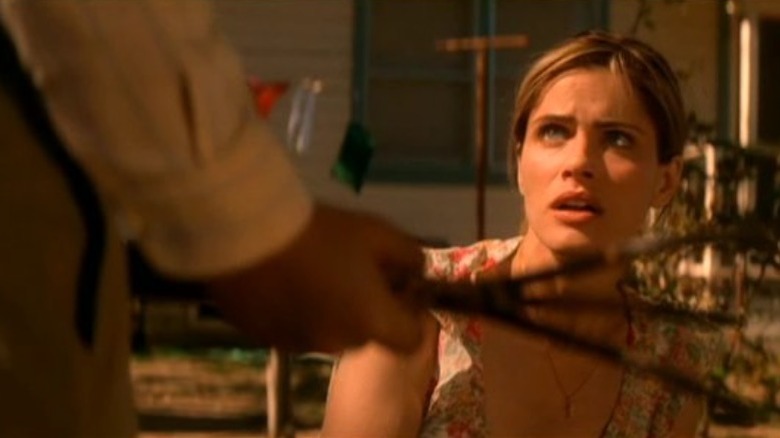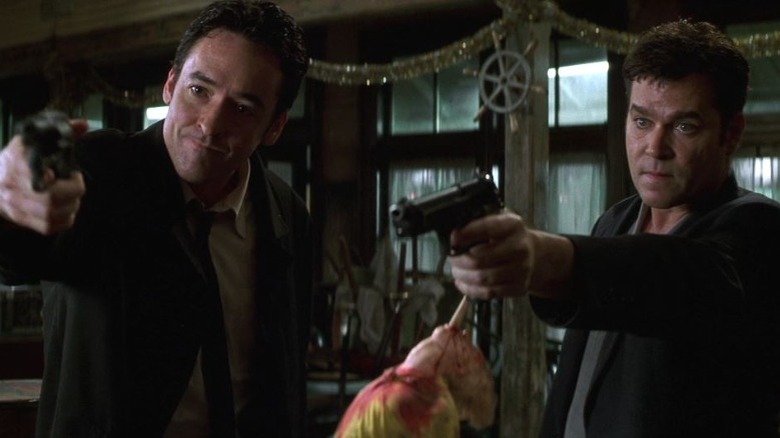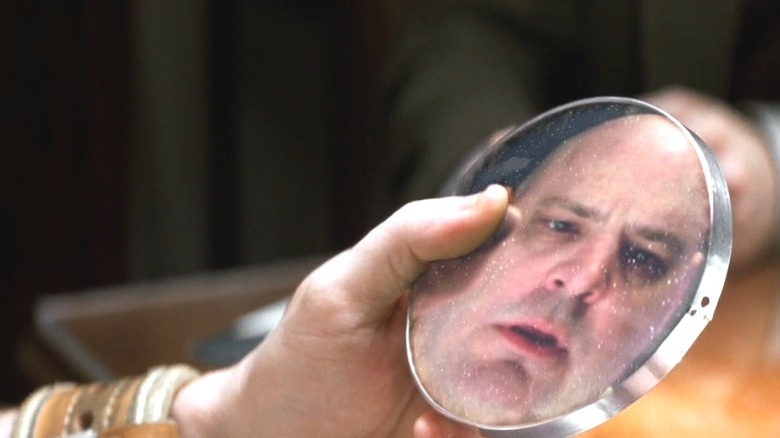The Ending Of Identity Explained
Loosely adapted from Agatha Christie's "And Then There Were None," 2003's "Identity" exemplifies the ability of director James Mangold to keep up with the Hollywood times. Before refining the star-studded music biopic to its platonic ideal with "Walk the Line" and proposing a new kind of movie for the superhero era with "Logan," he made arguably the most defining entry in the paranoia thriller resurgence of the 1990s and early-to-mid 2000s.
Like many of those nerve-racking movies, "Identity" starts with a simple enough premise: 11 strangers are stranded in a hotel during a rainstorm, and an unknown killer begins to kill them off one by one. But, again like all movies of its ilk, there's a complicating factor. We follow, in parallel, the hearing of a man convicted of multiple murders, whose execution may or may not be stayed on the grounds that he's legally insane. For most of the movie, it's not clear what those two stories have to do with each other, besides the common themes of murder and uncertainty.
Then, in the last few minutes, the movie delivers two huge twists in rapid succession, one folded into the other. These twists made "Identity" famous at the time, and while their degree of predictability was and still is a point of contention among viewers, there's no denying that the ending of the movie is a memorable one. Let's dig into it, then.
One of the twists in Identity is built up carefully, and the other comes out of the blue
The first twist of "Identity," as well as the first thing most people associate with it nowadays, is that the 11 strangers in the hotel are all the same person. Or, better yet, they're all different personalities of convicted murderer Malcolm Rivers (Pruitt Taylor Vince), and the "hotel" in which they're in is a figment of Malcolm's mind, representing the space they fight for in his consciousness. In other words, the "murders" we see at the motel are not really happening in the real world. They're merely a literalization of Malcolm's mental anguish. That's why, when the confrontation between Samuel Rhodes (Ray Liotta) and the rest of the group leaves Paris Nevada (Amanda Peet) as the sole survivor of the hotel massacre, psychiatrist Dr. Malick (Alfred Molina) takes it to mean that Malcolm's murderous personality is now gone — or so he thinks.
That first mind-bending twist, fittingly for its novelty, is built up carefully by the movie through details such as the numbered keys found next to each victim, the fact that each person in the hotel is named after a U.S. state, and the mid-film reveal that Malcolm suffers from dissociative identity disorder. The very last twist, however, is a complete rug pull. One of the guests we'd previously assumed to have died, the 9-year-old Timmy York (Bret Loehr), is shown to have faked his death, and is then revealed as the real mastermind behind all the hotel deaths. The movie ends with him killing Paris at her house in Florida and becoming Malcolm's only personality.
The ending leaves many unanswered questions — but that's okay
On a literal, mechanical level, there are some bones to be picked with the logic of the multiple-personality scenario in "Identity." For instance, when supposed correctional officer Samuel Rhodes turns out to be a criminal who, before the beginning of the movie, killed and assumed the identity of the real correctional officer transporting him and Robert Maine (Jake Busey), that leaves us to wonder: Was the real correctional officer also one of Malcolm's personalities? In that case, does he have more than 11? Moreover, if each personality exists separately in the "world" of Malcolm's head and is off doing their own business at any given moment, how exactly does the link between them and Malcolm's psyche work? When one personality takes over, as Ed Dakota (John Cusack) does at one point, do the others continue to have virtual experiences and accumulate memories? Is Malcolm's brain able to "dream" 11 different interlocked dreams at the same time?
But of course, those questions scarcely matter, because "Identity" is only meant to work as an illustration to us, the viewers, of what's going on in Malcolm's head. Every movie set inside the human mind, from "Inside Out" to "Eternal Sunshine of the Spotless Mind," is essentially a poetic summation of highly complex processes; "Identity" just stretches the poetry a little further. In the end, the motel story is simply an effective metaphor for Malcolm's emotional struggle with the reality of his actions — his personalities confront and fight each other over who the killer is because that's the war he's at with himself.
The problem with Identity's ending lies in the message it peddles
In almost every paranoia thriller, it scarcely matters if the puzzle "makes sense" or not, as long as it's emotionally effective. That's very much the case of "Identity," which explains why it's such a well-remembered example of the genre. If there is a problem with the ending, it has less to do with the orderliness of its inner world, and more with the relationship between that world and our own.
In our world, after all, movies are one of the first and most widespread ways through which people shape their understanding of mental disorders. And, though the metaphor of "Identity" works for the purposes of telling an affecting story, it also peddles an utterly ludicrous idea of how dissociative identity disorder (called "syndrome" in the movie) works. Per the informational website TraumaDissociation.com, "Any psychiatrist who ... states 'I knew there would be violence' as a result of 'treatment' or that identities should be 'killed off' is clearly unfit to practice." The website also posits that the movie's post-twist depiction of Malcolm "increasingly seemed to showed [sic] a psychotic disorder (breaks with reality) rather than Dissociative Identity Disorder."
Given that, per the same website, DID is not really associated with murderous delusions like Malcolm's, and that people with DID are more likely to be victims than perpetrators of violence, it's no wonder that a review of "Identity" on the website of mental health organization PermiaCare calls the movie "exploitative and unsatisfying," with "clichéd and derogatory images of the dangerous mentally ill." That the twist of "Identity" is still enjoyable after all these years speaks to James Mangold's craft as a storyteller, but be careful not to let it color your understanding of DID in the real world.



